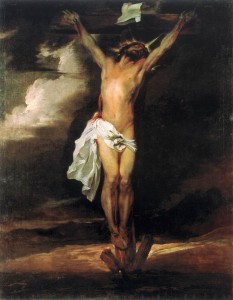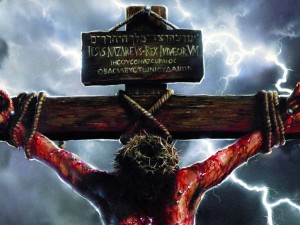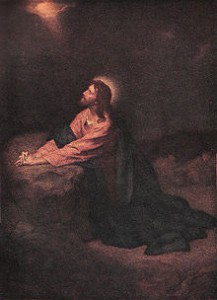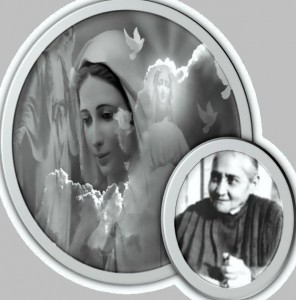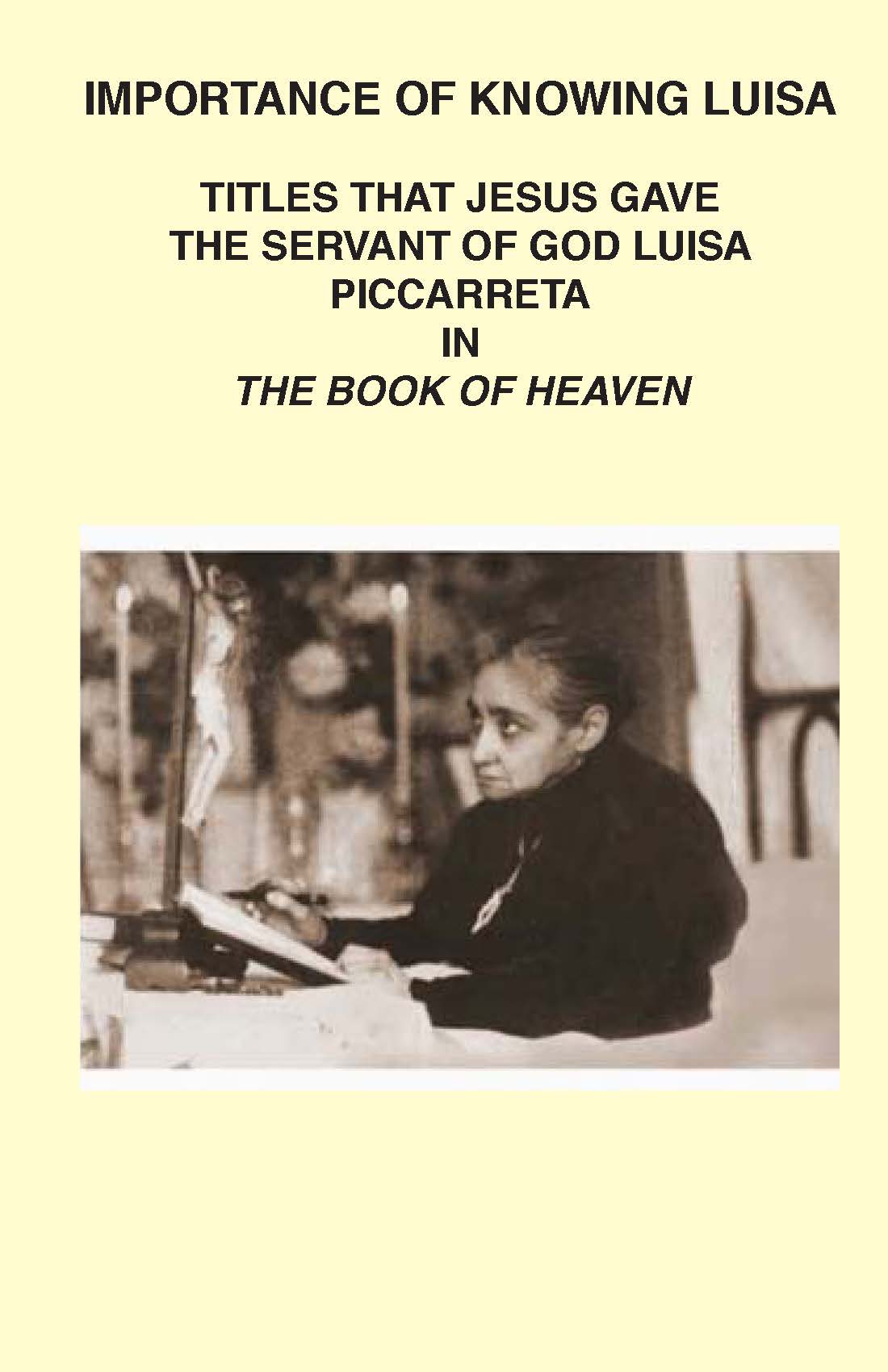Church Teaching on Mary’s Cooperation in the Redemption of Mankind
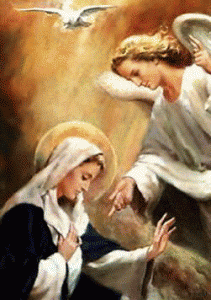 Compiled by Fr. William Most
Compiled by Fr. William Most
1. Leo XIII, Encyclical, Iucunda Semper, Sept 8, 1884. ASS 27. 178.
For when she presented herself to God as a handmaid for the role of Mother, or when she totally dedicated herself with her Son in the temple, from each of these she was already then a sharer in the laborious expiation for the human race. Hence we cannot doubt that she greatly grieved in soul in the most harsh anguishes and torments of her Son. Further, that divine sacrifice had to be completed with her present and looking on, for which she had generously nourished the victim from herself. Finally this is more tearfully observed in the same mysteries: There stood by the Cross of Jesus, Mary His Mother … of her own accord she offered her Son to the divine justice, dying with Him in her heart, transfixed with the sword of sorrow.
2. Leo XIII, Encyclical, Adiutricem populi, Sept. 5, 1895. ASS 28. 130-31.
For thereafter, by the divine plan, she so began to watch over the Church, so to be present to us and to favor us as Mother, that she who had been the minister of accomplishing the mystery of human redemption, would be likewise the minister of the dispensation of that grace, practically limitless power being given to her.
3. St. Pius X, Encyclical, Ad diem illum, Feb. 2, 1904, ASS 36. 453-55.
Hence that never disassociated manner of life and labors…. But when the final hour of her Son came, His Mother stood by the cross of Jesus, not just occupied in seeing the dread spectacle, but actually rejoicing that her Only-Begotten was being offered for the salvation of the human race. … from this common sharing of sufferings and will, she merited to become most worthily the reparatrix of the lost world, and so the dispensatrix of all the gifts which were gained for us by the death and blood of Jesus. … She … since she was ahead of all in holiness and union with Christ, and was taken up by Christ into the work of human salvation, she merited congruously, as they say, what Christ merited condignly, and is the chief minister of the dispensation of graces.
4. Benedict XV, Epistle, Admodum probatur, June 20, 1917. AAS 10. 182.
With her suffering and dying Son she suffered and almost died, so did she surrender her mother’s rights over her Son for the salvation of human beings, and to appease the justice of God, so far as pertained to her, she immolated her Son, so that it can be rightly said, that she together with Christ has redeemed the human race.
5. Pius XI, Apostolic Letter, Explorata res est. Feb. 2, 1923. AAS 15. 104.
… the sorrowful Virgin shared in the work of redemption with Jesus Christ…. COMMENT: The word “sorrowful” shows this was a cooperation on Calvary, not just in the annunciation.
6. Pius XI, Encyclical, Miserentissimus Redemptor, May 8, 1928. AAS 20. 178.
May the kindly Virgin Mother of God be present and smile on these our prayers and undertakings, who, since she brought forth Jesus the Redeemer, fed Him, offered Him as a victim at the cross, by her hidden union with Christ, and an altogether singular grace from Him, was likewise the Reparatrix, and is devoutly called that.
7. Pius XI, Radiomessage to Lourdes, April 28, 1935. Osservatore Romano, April 29, 1935.
O Mother of piety and mercy, who as Coredemptrix stood by your most sweet Son suffering with Him when He consummated the redemption of the human race on the altar of the cross … preserve in us, we beg, day by day, the precious fruits of the Redemption and of your compassion.
8. Pius XII, Encyclical, On the Mystical Body, June 29, 1943. AAS 35. 247.
She it was who, as the New Eve, free from every stain of original or personal sin, always most closely joined with her Son, offered Him to the Eternal Father together with the holocaust of her motherly rights and motherly love, for all the sons of Adam, defiled by his miserable fall.
9. Pius XII, Radiomessage to Fatima, May13, 1946, AAS 38. 266.
Jesus is King of the Eternal Ages by nature and by right of conquest; through Him, with Him, and subordinate to Him, Mary is Queen by grace, by divine relationship, by right of conquest, and by singular choice [of the Father].
COMMENT: The same title by right of conquest, is given for both Jesus and Mary. A triple subordination is carefully expressed, therefore there should be no other reservation thought to be understood. Hence, with subordination, the title applies in the same way to each.
10. Pius XII, Apostolic Constitution, Munificentissimus Deus, Nov. 1, 1950. AAS 42. 768.
We must especially remember this, that starting in the second century, the Virgin Mary is presented by the holy Fathers as the New Eve, who, although subject to the New Adam, was most closely joined with Him in that struggle against the infernal enemy , which, as was foretold in the Protoevangelium, was to come to the most full victory over sin and death, which are always joined together in the writings of the Apostle of the Gentiles. Hence, just as the glorious resurrection of Christ was an essential part and final sign of this victory, so that struggle of the Blessed Virgin in common with her Son, had to be closed by the glorification of her virginal body.”
COMMENT: In spite of the fears of some scholars, such as Altaner, the Pope found the Assumption in the sources of revelation in the New Eve theme, and more precisely, in her cooperation on Calvary, which was most close, to such an extent that the Pope even could speak of a struggle that was “common to the Blessed Virgin and her Son”.
11. Pius XII, Encyclical, Fulgens corona, Sept. 8, 1953. AAS 45. 583.
… she was joined with her Only-begotten Son in the struggle against the most wicked infernal serpent.
12. Pius XII, Encyclical, Ad Caeli Reginam, Oct. 11, 1954. AAS 46. 634-35.
In accomplishing this work of the redemption, the Most Blessed Virgin Mary was certainly closely joined with Christ … was associated with Jesus Christ, the very principle of salvation, by divine plan, and indeed in a way similar to that in which Eve was associated with Adam, the principle of death, so that we can say that the work of our salvation was accomplished according to a certain recapitulation … and if she was joined with her Son, even on Golgotha, [and] she offered Him, together with the holocaust of her Mother’s rights and love, like a New Eve, for all the sons of Adam, defiled by his wretched fall, as a result, beyond doubt, it is right to conclude that just as Christ, the New Adam should be called King not only because He is the Son of God, but also because He is our Redeemer, so by a certain analogy, the most Blessed Virgin is Queen, not only because she is the Mother of God, but also because as the New Eve she was associated with the New Adam
COMMENT: Mary acted in a way parallel to that of Eve, who did not receive a sin from Adam [as the German Mariology would imply] but in an effective and active way generated sin. Therefore Mary’s work was not active receptivity , as the Germans assert, but an effective and active cooperation in generating the title for the Redemption.
13. John XXIII, Radiomessage to Eucharistic Congress of Italy at Catana, Sept. 13, 1959. AAS 51. 714.
We trust that they will imitate in her the most perfect model of union with Jesus, our Head; we trust that they will join Mary in the offering of the divine Victim….
14. John XXIII, Homily for the Canonization of St. Peter Julian Eymard. Dec. 9, 1962. AAS 65. 10.
Intimately associated in the Redemption in the eternal plans of the Most High, Our Lady, as Severianus of Gabala sang, is the mother of salvation, the fountain of light made visible.
15. Vatican II, Constitution on the Church, #58, #61.
So also the Blessed Virgin advance in her pilgrimage of faith, and faithfully bore with her union with her Son even to the cross, where, in accord with the divine plan, she stood, vehemently grieved with her Only-Begotten, and joined herself to His Sacrifice with a motherly heart, lovingly consenting to the immolation of the victim born of her.
In conceiving Christ, in giving birth to Him, in feeding Him, in presenting Him to the Father in the Temple, in suffering with Him, as He died on the cross, she cooperated in the work of the Savior in an altogether singular way, by obedience, faith, hope and burning love, to restore supernatural life to souls.
COMMENT: Her cooperation was by way of obedience, which was the covenant condition. She cooperated officially “in accord with the divine plan”: as the New Eve. She was made interiorly apt for this by the Immaculate Conception. Such a cooperation is clearly active, in generating the title for redemption.
16. John Paul II. Encyclical, Redemptoris Mater, March 25, 1987. AAS 79. 382. 83. Vatican Press Translation.
How great, how heroic then is the obedience of faith shown by Mary in the face of God’s ‘unsearchable judgments’! How completely she ‘abandons herself to God without reserve, ‘offering the full assent of the intellect and the will’ to him whose ‘ways are inscrutable…. Through this faith Mary is perfectly united with Christ in his self- emptying…. At the foot of the Cross Mary shares through faith in the shocking mystery of this self-emptying. This is perhaps the deepest ‘kenosis’of faith in human history. Through faith the Mother shares in the death of her Son, in his redeeming death…. as a sharing in the sacrifice of Christ–the new Adam–it becomes in a certain sense the counterpoise to the disobedience and disbelief embodied in the sin of our first parents. Thus teach the Fathers of the Church and especially St. Irenaeus, quoted by the Constitution Lumen gentium: ‘The knot of Eve’s disobedience was untied by Mary’s obedience; what the virgin Eve bound through her unbelief, the Virgin Mary loosened by her faith.’
COMMENT: In his Apostolic Exhortation Redemptoris Custos, the same Pope said that in Redemptoris Mater, he intended to deepen the teaching of Vatican II on Mary’s faith.
17. John Paul II, Allocution at the Sanctuary of Our Lady of Guayaquil, given on Jan 31, 1985, reported in L’Osservatore Romano Supplement of Feb. 2, 1985 and in English L’Osservatore Romano, March 11, 1985, p. 7.
Crucified spiritually with her crucified Son (cf. Gal 2:20), she contemplated with heroic love the death of her God, she ‘lovingly consented to the immolation of this Victim which she herself had brought forth’ (Lumen gentium #58) … as she was in a special way close to the Cross of her Son, she also had to have a privileged experience of his Resurrection. In fact, Mary’s role as co-redemptrix did not cease with the glorification of her Son.
Compiled by Father William G. Most
Electronic text (c) Copyright EWTN 1996. All rights reserved.



